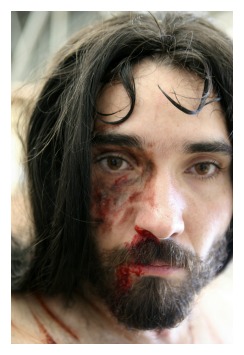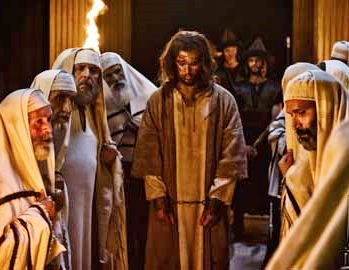Is there any reason for good person to die young? Why should someone be
sentenced to death when they were declared innocent? Why should one dedicated
to doing good suddenly have their life cut short? And how can it be declared God’s will for
such to happen?
And
yet, this is exactly the scenario that the New Testament proposes. Jesus was a man who did good, who healed many
and taught thousands to change from doing evil to doing good. He claimed as a basic principle never to harm
another. But the authorities of
Jerusalem branded him a rebel whose goal was to overturn their authority. And because of his rebellion, he was
killed. And yet, all of this was,
according to the New Testament, God’s plan and desire—the God of mercy and
justice. How could this be?
We need to understand the underlying
reasons for Jesus’ death—which from our perspective is insanity and injustice,
but for the purposes of God it is right and good.
I. Historical
Reasons for Jesus’ death
Jesus died because he
threatened the temple of God.
“Destroy
this temple and in three days I will raise it up.” (John 2:19) Jesus made this statement
publicly, right after he cleansed the temple of the impurity of buying and
selling. Jesus never said that he would
destroy the temple himself, but he did declare it impure, and he said that it
would be destroyed by God (Mark 11:11-20; Mark 13:1-2). But the temple was the center of Jewish
religion in that day, and the leaders of Jerusalem needed it to remain that
way. The temple was the center of the
authority of the priesthood and the ruling Council of the Jews. If it was destroyed, then their power would
be wiped away immediately. Jesus seemed
to threaten the temple (Mark 14:55-58), and so, in the mind of the Jewish
authorities of Jerusalem, he must be stopped (John 11:47-57).
Jesus died because he
claimed to replace the government of God’s people.
Jesus
entered into Jerusalem as a great ruler, which was questioned by the Jewish
authorities of Jerusalem (Matthew 21:1-9, 23-27). When they questioned him directly about his
claims to authority, he agreed that he was the one whom God established as king
over God’s people and that he would reign over the priesthood and the ruling
Council. That a borderline heretic could
rule over them was unacceptable to the Council and they made a final
determination that he should die. (Mark 14:55-61).
Jesus died because justice
was replaced by mob rule.
Because
the Council was under the thumb of the Roman government, they had to ask
permission to kill Jesus. They presented
Jesus to the Roman governor of Jerusalem as a rebel wanting to replace Caesar
as lord of the earth. Pilate questioned
Jesus, and while Jesus declared himself to be king, it was clear that he was
not king as Caesar was (John 18:29-38).
Because he had done nothing rebellious, the governor declared him
innocent. But the Jerusalemites
listening to this trial demanded that Jesus be killed for sedition. Finally, Pilate was swayed by the crowds, and
allowed Jesus to be killed. (Mark 15:12-15).
II. Jesus’ Own
Reasons for Dying
Jesus died because he chose
to.
But
Jesus did not die simply because of the injustice of the Jewish and Roman
governments. Jesus declared many times
ahead of time that it was God’s plan for him to die at the hands of these governments
(Matthew 20:18-19) and he accepted the will of God in this (Mark 14:36). He could have escaped at his arrest, but
chose not to (Matthew 26:50-56). He
could have phrased his answers to be more acceptable to the Council or to
Pilate, but he was being deliberately unhelpful toward his release (John
19:9-10). Jesus was prepared for his
death and he did what he could to make sure it happened, even though the final
decision was Pilate’s.
Jesus died to make himself
king over God’s people.
Why
did Jesus make that choice? Why did he act in agreement with his own
death? Because he saw his death as a
means to an end. He determined that he
needed to rule over God’s people. But to
be a ruler under God, he couldn’t just be at the head of an army or gain the
acclamation of the people. Rather, he
had to be appointed by God. To do this,
Jesus had to prove to be a perfectly righteous ruler, one who would do God’s
will rather than act for his own benefit.
Also, Jesus needed to be oppressed by the ruling governments, to prove
that they were unworthy to rule. This
would cause God himself to act, to put down the unrighteous who raise
themselves to power and to raise up the righteous who lowered their own desires
(Luke 14:11). In this way, Jesus allowed
himself to die to allow God to act for his ambition to rule.
Jesus died to free people
from oppressive rule.
But
Jesus didn’t want to rule from his own ambition alone. Rather, he desired to rule, because he saw
God’s people as being without decent leadership (Mark 6:34). Jesus saw the people as under Satan, needing
deliverance from his rule of misery and death (Matthew 12:43-45). Jesus saw the teachers of God’s people as
being too ready to judge, and unlearned in the ways of God’s mercy (Matthew
12:7). And Jesus saw the whole
priesthood and temple system as impure and idolatrous (Mark 11:15-17). Jesus desired to sacrifice himself for the
sake of all those who truly desired to worship and follow God, but had no way
to do it (Mark 10:45).
III. What Jesus’
death shows us
Jesus died to display the
way of faith.
Jesus
knew that the one whom God was pleased with is the one who is so faithful to
God that he is willing to sacrifice everything he is and everything he has for
him (Luke 14:33). Jesus determined to be
a man so wholly devoted to God that he would die. And he also said that anyone who would gain
the life that God has to offer must be so completely devoted (Mark
8:31-38). And so Jesus showed—not just
taught—that the one who loves God most is the one who would obey God to the
very end (Mark 13:13).
Jesus died to demonstrate
the result of faith.
Jesus
knew that if he died that God would act in certain ways. Whoever, in God’s name, destroyed God’s
obedient servant, would be destroyed by God (Mark 12:1-9). Whoever lowered themselves for God’s sake and
God’s people would be raised by God to rule (Luke 14:11). And whoever died because of their devotion to
God, would be raised from the dead (Mark 8:35).
Three days after Jesus’ death, God raised him from the dead to prove the
third principle. After showing himself
to the disciples for many days, God rose Jesus up to political authority over
heaven, under the Father. And in 70AD,
the temple and the priesthood and the ruling Council of the Jews were
destroyed, even as Jesus predicted.
The power of
faith is self-sacrifice for others.
This is the
way of freedom.










